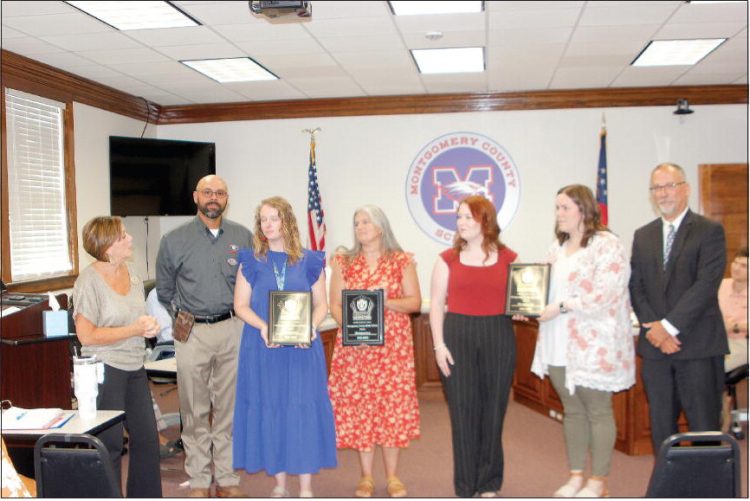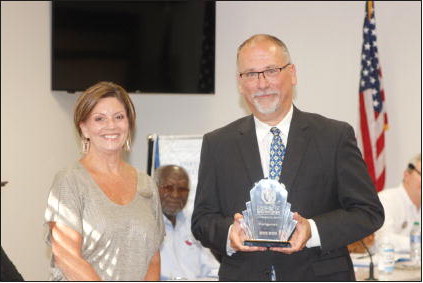MCBOE Recognizes Beta Club Excellence


mrandolphadvance@gmail.com
At its regular monthly meeting on August 21, the Montgomery County Board of Education recognized the Beta Club sponsors in the school system for their work in helping the district earn the coveted District of Distinction National Recognition.
According to Assistant Superintendent Beverly Faircloth, the school system has received the award for six years, which she said is a true accomplishment because of the selectiveness of the title. “We have a very robust Beta Club in Montgomery County. As a matter of fact, this is a National District of Distinction Award and there are over 7,700 clubs in the nation – we are 1 of 42 in the nation that got this award,” she remarked.
Montgomery County Elementary School Beta sponsor Whitley King, Montgomery County Middle School Beta sponsor Leslie Thomas, and Montgomery County High School Beta sponsors Kerri Anderson and Rebecca Phillips received plaques to place in their respective schools commemorating the honor.
Public Participation
During the public hearing before the meeting, citizens Amie Vassey and Linda Page both spoke to the Board about their concerns with taxes and transparency.
Vassey began the conversation, stating, “I think the budget looks great. I’m not asking you guys to make any type of changes to the budget that would shortchange the education of any of the students in this system in any kind of way. I am simply asking that you get creative in the way that you fund it,” she explained.
“I respectfully request that you take $190,000 from the [General Fund] balance and apply it up under the Revenues to offset the ad valorem tax needed from the residents, so that you can charge 14 mills instead of 15 – that is the ask,” Vassey continued. “We do not want 0.25 mills, we don’t want 0.50 mills [lower], we want an entire mill – that is what we are asking for. We are asking you to use money that you have already taken from us in previous years that is in the fund balance – which is more than double what the state recommends – and use it this year to give the residents in this county a tax break.”
Superintendent Stan Rentz also commented on the upcoming budget and millage rate decision. He began by referring to a handout he provided attendees which detailed the difference between Georgia School Board members and other elected officials.
“School board members are different than any other county officials – that’s county commissioners, that’s city councilman, that’s senators and congressmen. They are the only elected special purpose government in this state,” he explained.
Rentz referenced both Georgia laws and guidelines from the Georgia School Board Association that emphasized these differences. According to the state law, “the motivation to serve as a member of a local board of education should be the improvement of schools and academic achievement of all students.” The Georgia School Board Association elaborates on this principle, as it states, “Because school board members are responsible for making decisions for the greater good, they do not make decisions just so they can get re-elected or at the benefit of special interests or lobbyists…. While school board members represent everyone in their districts, they are charged with making sure the students’ needs in their school system are first and foremost their top priority.
“I certainly understand that everyone in this audience, and, quite frankly, everyone at this table, wants to pay the least amount of taxes possible. I don’t think there is any argument from any of us in this room,” Rentz added. “I know that there is some anger in this room – at least there was some anger in this room – directed at the initial assessed value of property – much more than many of you thought was fair, and quite frankly, much more than a lot of our board members thought was fair. Of course, as y’all know, the Board of Education has nothing to do with assessments and valued property. We do approve a budget and we set a millage rate, and I understand that that’s why we have people here tonight.”
He continued, “There is a reason why there are five Board members, and that reason is collectively, this group can make better decisions than any one individual. You’ll frequently hear me say – not only to this Board but to our staff – that ‘None of us are as smart as all of us.’ Let that soak in for just a second – collectively, the diversity of this Board and experience of this Board helps us make far greater decisions than anyone in this room could do. I firmly believe that, it’s my mantra, and I live it every single day.”
Rentz said that when making tough decisions, he did not singlehandedly determine what the best option is – he consults with others. “I want as much input as I can get to help make smart decisions,” he emphasized.
“If the primary goal of anyone up here on this Board was to get reelected, I think we know the easy way to do it. You start talking about slashing budgets, lowering millage rates – that’s going to be a very popular opinion with tax payers, especially those who don’t have kids in school or don’t really care about public education,” Rentz continued. “I’m thankful that this Board recognizes that they are different than any other elected officials. They are charged with making sure that the needs of all our students are first and foremost their top priority, and that’s directed by the state code of Georgia. Of course, they also know we want to do it as efficiently as possible.”
He informed attendees that the Board had instructed him to encourage employees to seek out grants. He shared that a lot of necessary funding had come from grant money that the staff themselves had applied for. Recently, this funding included $190,000 for School Food and Nutrition to improve the district’s lunch program and over $150,000 for the Department of Exceptional Learning to assist students with special needs. “House Bill 538 requires literacy training for all teachers in [kindergarten through third grade]. Having the very best training would have cost us over $70,000. Dr. Faircloth contacted the state, and as a result, our RESA – which is a collection of schools in the area – was able to bring the training to us at our RESA district for no cost,” Rentz elaborated. “All of those things I just mentioned were needed for our students – not extras.”
He added, “There’s other examples [of these grants] right now. There’s playground equipment at the elementary school that we could have gotten by without, but a grant paid for that. The Board has directed me to [have staff seek these grants], and our folks take it very seriously. We try to use as much outside funding and grants as we possibly can because we understand that the more that we can do that, the less we have to spend out of our budget.”
Rentz commented on the passion and character of the Board members, noting that the position was often a “thankless job,” but they continued to serve selflessly. He also assured the attendees that the board members are committed to learning and being knowledgeable about school finance, as he explained that the group had asked that their state-mandated “Whole Board Training” hours be focused on learning more about the financial side of the school system.
“So here is my ask of the public: I ask that you trust the officials who were elected by you to make the best possible decisions for our school system. I find an irony in this – the year that we are slashing this budget, at least federally, by almost $2 million, and have committed to lowering the millage rate, yet for some, that is not enough. If your opinion is different, I respect that. Quite honestly, I don’t believe there is a right or wrong on this. But I tell you that if you disagree with the decisions, you deserve to know the reason the decision is made. I treat my folks like that – if we make a decision, I want to know why. We can disagree civilly and respectfully, but you need to know why,” he continued.
Rentz told the audience of several challenges the school district is facing – classified employees’ benefits will double within the next two years and Montgomery County school teachers are the lowest paid teachers in the state.
“We believe in transparency. We’ve shown you some of the challenges that we know are coming. Those that have been in the Board the longest have seen those hard times, they know those challenges. They have seen those times we had to furlough teachers and take 10-15 days not only from our teachers, but from our students for instructional purposes. I believe I speak for the whole Board when I say that we believe the responsible and most prudent thing to do is to move cautiously, but with purpose – not to react, but to be proactive,” Rentz added.
He encouraged the public to speak with the Board members which represent their districts. “I can assure you this – they’re going to listen. If it’s a policy issue, I want you to talk to them. If it’s [an issue with] day-to-day operations, I’m the person to be speaking to. We can certainly learn from each other. Your opinion does matter. It is valued,” he emphasized. “The children of Montgomery County deserve no less than the very best.”
Citizen Linda Page addressed the Board about her concerns with the rise in taxes, citing her experience with education. “I taught as a high school dropout, who was put out of school because I got married at 15. [I went back and gained my education, and was able to teach several years.] I can tell you what an education does for people. I stand here able to pay the rise in taxes, but there are a whole lot of people in the County who can’t. There is a friend of mine who lives beside the railroad tracks who is wor- continued from page
ried she is going to lose her house. I just say that to say this: the thing about the training that bothers me is that if you call it ‘training,’ it leaves [the citizens] out. It’s not good to leave citizens out,” she shared.
Page referred to her time as a teacher, as she explained that she took every opportunity to attend training and learn more about her career. “Almost everything I ever learned was a value to me in that classroom,” she told the Board. “I just have a problem with you leaving me out of training that would help all of us to understand this thing. It seems very secretive. I know the law – the law says you can call it ‘training,’ then you don’t have to invite the public. I know you can’t invite everybody, but to me, you could invite some people who are there for the right reasons.”
She continued, “I’m not here for the wrong reasons. My great-grandchildren are in this school system because I literally said to my granddaughter, ‘please, don’t send them to Vidalia – send them to where you’re going to live. Be a part of this community. Be a part of making it a better place for us – for the people who have lived here a long time and want to see a better us – not a better them, not a better him, not a better her, not a better you – a better us. I was not born in this community, I made 27 school moves by the time I was in the 10th grade and quit school. So, I don’t have any place that was really home [to me], but I call this place home, and that says something for this place. That says something for you folks. That says something for these folks.”
“I’m proud to be here,” Page added. “I want to be a part of it. I don’t want you to exclude me. I want to listen to the training, too. I want to hear what these people have to say. I’m not going to raise a ruckus – I’ll ask questions, but just think about that. Think about if you want to begin to exclude people in a time when we are – well, at least some people – in a rut with each other. I’m along for the ride; I’ll make a little noise, probably, but that’s what we should do as good citizens.”
Page emphasized, “Thank you for thinking about what I’m saying. Thank you for thinking to include everyone. I will be part of this because I want my great-grandchildren to get a great education. I’ve been through the cuts. I got cut to the Director of Alternative School – best cut I ever had. Thirteen kids graduated my first year, and we had not graduated one in years, so they didn’t cut me far. They cut me to a happy place.”
Rentz replied to Page’s concerns, informing her that the “Whole Board Training” referred to the three hours each year required by the Georgia School Board Association to train Board members on the elements of the school system. He, along with Chairman Henry Price, also clarified that the homestead exemption training which Page shared she was concerned about was not a training conducted by the Board of Education, but rather a training that the Montgomery County Commissioners had invited the Board to attend.
Price, Rentz, and Page engaged in a conversation which encouraged the citizens to continue to show up to meetings, speak their concerns, and take part in their local government. Suggestions were made to include the public in future planning and discussion sessions for the Board, such as the suggestion by Board member Fernando Rodriguez to provide more information to the public in a timely manner during the annual “Board Planning Retreat,” so that they may have a better chance of attending the event.
During the regular meeting of the Board, Amie Vassey again addressed Board members, asking them if there is anything that could have been said during the public hearings to change the planned action of the Board’s budget and millage rate. “Is there anything any taxpaying citizen could have said that would have mattered?” she emphasized.
Action Items
The FY24 Budget was officially approved by the Board, which has almost $2 million less of COVID relief funding than past years, and is expected to utilize 14.75 mills of property taxes. This millage rate will be voted on in a called meeting on August 31.
An update to “Board Policy DIB: Financial Reports” was adopted, as recommended by the Board’s attorney and state officials. This change includes capital assets, such as land and school buildings. This policy update was first presented at last month’s regular meeting of the Board, and sat on the table for public review for 30 days prior to the official vote.
The Board also approved the purchase of a Ford F-150 pickup truck to be utilized by the Superintendent and staff of the school system for any school-related travel. The vehicle will be bought from Paul Thigpen Chevrolet, which provided the lowest quote on the product.
Several personnel decisions were made, such as the acceptance of bus driver Rhonda Edge’s resignation, effective on August 2. Stephanie Peebles was hired as an elementary school in-school suspension (ISS) paraprofessional, Kailee Smith was approved as a second and third grade paraprofessional, and William Rowe was hired as an Alternative School teacher.
Several substitutes were approved, including substitute school food and nutrition workers Teresa Floyd and Taieisha Reese, and substitute teachers Rachea Holliway, Kimberly Dees, Terri Griggs, and Tracy Sailem, Jr. Sailem will also serve as a volunteer middle and high school basketball coach.
The Board added five days to high school counselor Rebecca Phillips’ contract to fulfill her counseling duties, while School Improvement Specialist Ginger Morris’ contract was increased to 220 days and Director of Communications Michael Lane’s contract was increased to 200 days. Board members also agreed to grant Emily Cartwright a $1,500 supplement for serving as an instructional coach at the elementary school.

DISTRICT OF DISTINCTION – Assistant Superintendent Beverly Faircloth (left) presented Superintendent Stan Rentz (right) with the National Beta Club District of Distinction award, which will be displayed in the Montgomery County Board of Education office.Photo by Makaylee Randolph







